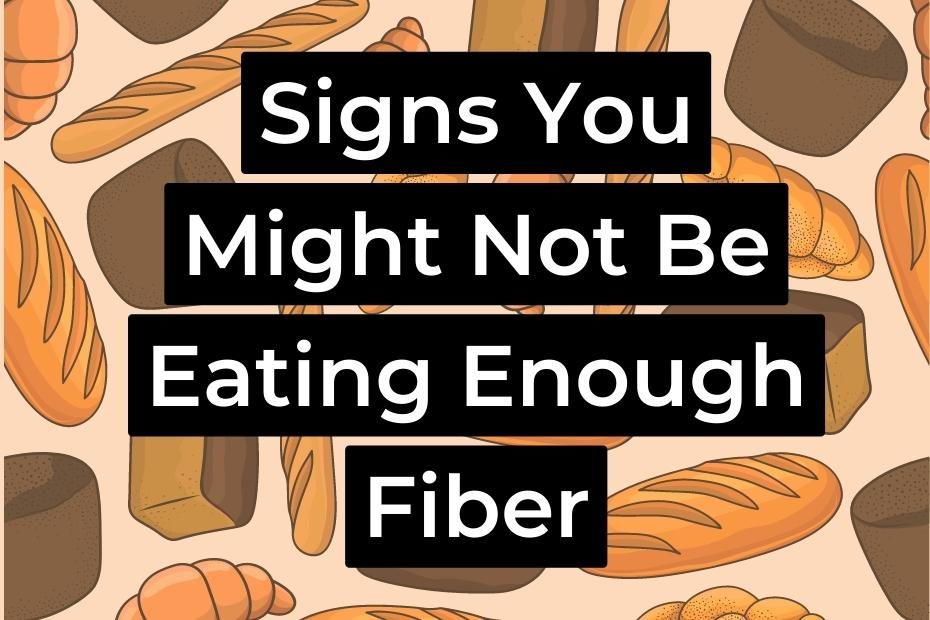Do you suspect you might not be eating enough fiber on a daily basis? Here’s our guide to the key signs to look out for!
Fiber plays a major role in our overall health – maybe even more so than you realize! As you may already know, fiber keeps you regular, helps you maintain a healthy weight, and keeps your gut health in check. Beyond that, it may also prevent heart disease and diabetes, as well as some types of cancer.
Be honest: do you pay much attention to the amount of fiber you’re consuming? Despite how important it is for our wellbeing, many of us simply don’t give it a second thought. What you may not realize is that some of the side effects and symptoms you may be dealing with may actually be connected to the amount of fiber you eat!
In order to help you feel your best and hit your wellness goals, we wanted to create a helpful guide to the top signs that may be telling you you’re not eating enough fiber. Keep reading to learn about the 5 key signs!
It goes without saying, but if you’re dealing with any of the symptoms listed below, be sure to talk to a medical professional. A doctor will help you pinpoint the root cause (whether it’s related to fiber or something else), and guide you on the path towards feeling incredible!
The Top 5 Signs You’re Not Eating Enough Fiber
- You feel constipated

There’s a good chance you already know this one, but it’s an important sign to highlight! One of the biggest indicators that you’re not getting the necessary fiber in your diet is constipation, which is often accompanied by bloating. Fiber keeps things moving in your digestive system by adding bulk to your stools. Since it absorbs water, it also creates softer stools, which is easier to pass through the digestive tract.
- You’re gaining weight and/or having a difficult time losing weight

Another common sign that you are not eating enough fiber is weight gain, or trouble with losing weight. This is because fiber plays a huge role in making you feel satiated. A diet that is rich in fiber will help you feel full and satisfied for longer, so you won’t feel the urge to consume extra unnecessary calories.
- You have high cholesterol levels

If you have high cholesterol levels, fiber may be playing a role. Soluble fiber works to lower cholesterol by absorbing it and passing it through your body. This in turn minimizes the absorption of cholesterol in your body, since it has fewer chances to enter the bloodstream.
- You have low energy levels

Feeling sluggish? A lack of fiber may be to blame! Fiber works to keep blood sugar levels stable by slowing down the digestion of glucose. This in turn gives you more sustained energy throughout the day. On the other hand, with lower amounts of dietary fiber, you’re more prone to blood sugar level spikes. This eventually leads to the blood sugar level crashes that make you feel tired. Side note: this can also make you feel nauseous!
- You feel hungry – even after you just ate!

As mentioned, fiber helps you feel fuller for longer, because it is digested more slowly and because it absorbs water. A diet that is low in fiber will leave you feeling hungry practically as soon as you’ve finished a meal! If you find yourself reaching for snacks after your meal, try adding more fiber to your diet.
Tips for Adding More Fiber to your Diet

Naturally, if you’re experiencing any of these symptoms and believe fiber may be the culprit, adding fiber-rich foods to your diet is key. This includes whole grains, fruits, vegetables, nuts, seeds, beans, and legumes.
For sneaking in some extra fiber every day, we also love drinking our daily cup (or two!) of Super Amazing Coffee. Each serving only has 30 calories, but contains 3 grams of fiber, which encourages a healthy digestive system! Beyond the fiber, Super Amazing Coffee also contains 12 plant-based superfoods, including turmeric, matcha, chaga, cocoa, and more. These superfoods boost metabolism and curb cravings while improving energy levels and beating brain fog!
As you work more fiber into your diet, keep in mind that you may experience gas or bloating as your body gets used to it. This is totally normal! For an easier adjustment, gradually work more and more fiber into your diet, rather than adding a ton at once. You should also drink plenty of water, which will aid in the digestion process!
Want to add more fiber to your diet? Check out our Super Amazing Coffee!
Looking for more health and wellness tips? Be sure to take a look at our blog!
